Jade Varden's Blog, page 24
October 22, 2014
Writing 101: The Epiphany
It is not uncommon for literary characters to make mistakes. Sometimes, they will even commit some wrong. But the worst characters can be redeemed, or gain sudden insight, with a simple literary technique: the epiphany.

Come to Jesus
The epiphany, also known as the come-to-Jesus moment, gives your character sudden clarity. They realize something they did not before, and in this fashion find redemption or otherwise advance their plot. The epiphany is used a lot in literature. It happens a lot less frequently in reality.
Sudden insight is marvelous, but it's as rare for most people as being struck by lightning. For most people, insight is only achieved through dialogue with someone else. Less commonly, it's found through reading or watching TV or some other non-interactive entertainment. But sometimes, our own thoughts do finally align and suddenly, there is reason and logic inside one's own mind. Epiphany. Realization has been gained, and out of nowhere, too.
If you're going to write it, make it feel real. The only way to really do this is to take readers,step-by step, through the character's thought process. Readers want to understand how this sudden insight has been reached. Show them. Guide them through your character's mind, and show how clarity has been obtained.
Epiphany is not something that all people experience. But if you write it well enough, they'll feel as though they have.

Come to Jesus
The epiphany, also known as the come-to-Jesus moment, gives your character sudden clarity. They realize something they did not before, and in this fashion find redemption or otherwise advance their plot. The epiphany is used a lot in literature. It happens a lot less frequently in reality.
Sudden insight is marvelous, but it's as rare for most people as being struck by lightning. For most people, insight is only achieved through dialogue with someone else. Less commonly, it's found through reading or watching TV or some other non-interactive entertainment. But sometimes, our own thoughts do finally align and suddenly, there is reason and logic inside one's own mind. Epiphany. Realization has been gained, and out of nowhere, too.
If you're going to write it, make it feel real. The only way to really do this is to take readers,step-by step, through the character's thought process. Readers want to understand how this sudden insight has been reached. Show them. Guide them through your character's mind, and show how clarity has been obtained.
Epiphany is not something that all people experience. But if you write it well enough, they'll feel as though they have.
Published on October 22, 2014 05:30
October 21, 2014
My Quest to Be More Like Virginia Woolf
I'm going to be honest here: I don't know that much about Virginia Woolf. She was a writer, and she came to a rather poor end after penning many well-loved books. For my purposes, that's not important. My recent quest to be more like Virginia Woolf isn't about her books. It's about how she wrote them.
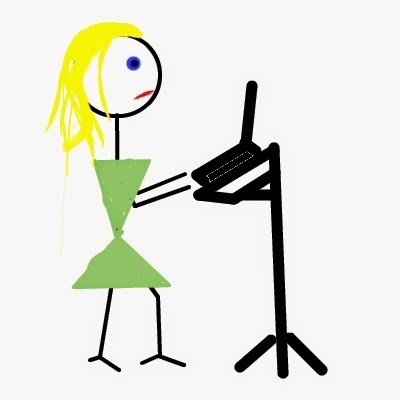
Will the Real Jade Varden Please Stand Up
Legend says that Virginia Woolf actually wrote standing up. This is a contrast to Truman Capote, who purportedly wrote lying down. Woolf had a competitive relationship with her sister, an artist. In a stunning bit of sibling rivalry, Virginia Woolf chose to write while standing so her sister could not say writing was an easier job than being an artist. I don't have a sister, but I think the idea of standing up is absolute perfection.
I've been falling asleep lately. Well, let's call it dozing off. The point is, I've been jolted awake more than once and my hands are on the keyboard. I may even drift off mid-sentence, no kidding. It's not entirely my fault. I got three and a half hours of sleep last night, and I work out for at least an hour every day so I begin my whole day already feeling exhausted. Once I sit down, I'm in constant danger of just falling asleep.
This is why I want to pursue the Virgina Woolf method of writing, and simply stand up instead. I have recently been conducting experiments to test the viability of this plan. So far, it's not working. However, I remain hopeful that soon, I can write without dozing off.
I'll keep you posted.

Will the Real Jade Varden Please Stand Up
Legend says that Virginia Woolf actually wrote standing up. This is a contrast to Truman Capote, who purportedly wrote lying down. Woolf had a competitive relationship with her sister, an artist. In a stunning bit of sibling rivalry, Virginia Woolf chose to write while standing so her sister could not say writing was an easier job than being an artist. I don't have a sister, but I think the idea of standing up is absolute perfection.
I've been falling asleep lately. Well, let's call it dozing off. The point is, I've been jolted awake more than once and my hands are on the keyboard. I may even drift off mid-sentence, no kidding. It's not entirely my fault. I got three and a half hours of sleep last night, and I work out for at least an hour every day so I begin my whole day already feeling exhausted. Once I sit down, I'm in constant danger of just falling asleep.
This is why I want to pursue the Virgina Woolf method of writing, and simply stand up instead. I have recently been conducting experiments to test the viability of this plan. So far, it's not working. However, I remain hopeful that soon, I can write without dozing off.
I'll keep you posted.
Published on October 21, 2014 05:30
October 20, 2014
Writing 101: The 5 Character Names All Writers Should Avoid
In fiction, certain names have associations that you just can't shake. No YA author can include a "Bella" in their book, for example, and if you throw a "Romeo" out there it's just going to be a distraction. Some names have a deeper meaning and a preexisting link to another literary project. That's why you should avoid those names altogether.
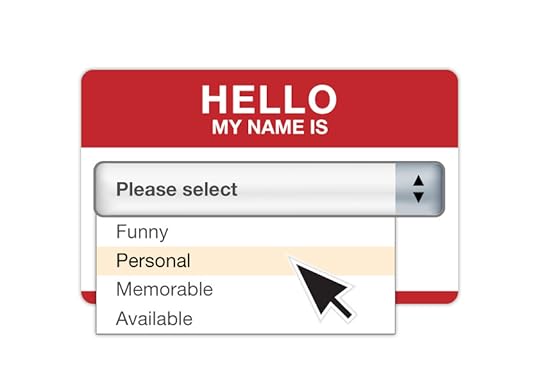
Betty and Veronica
There are many, many names that are probably a bad idea when it comes to writing fiction. After all, Dagmar is a name. But when it comes to naming characters, be sure to avoid these 5:
Mary Sue: The name Mary Sue has become an archetype, rather than a real person. When a character is a Mary Sue, he or she unwittingly saves the day by being clever and good. It's a plot device, and it generally doesn't work.Damien: Blame it on the movies. This isn't even a literary name, but it does immediately alert the audience that this is an evil character. The name is really over-used, and attaching this name to an evil character is really over-done.Judas: One of the most famous names of all time, Judas has come to be much more than a name. It means betrayal, and everyone knows it. So if you use this name, you're telling your readers the entire plot of your book. Adolf: Too much historical significance. No one uses this name. Hermione: J.K. Rowling ruined it for everybody. You can't think of this name without thinking of Emma Watson, and believe me no one else can do it, either.
Avoid the 5 names that have way too much meaning, and avoid alerting your readers to your entire plot before it has the chance to unfold. If your characters have certain traits, show it to readers with your writing -- not with your naming.

Betty and Veronica
There are many, many names that are probably a bad idea when it comes to writing fiction. After all, Dagmar is a name. But when it comes to naming characters, be sure to avoid these 5:
Mary Sue: The name Mary Sue has become an archetype, rather than a real person. When a character is a Mary Sue, he or she unwittingly saves the day by being clever and good. It's a plot device, and it generally doesn't work.Damien: Blame it on the movies. This isn't even a literary name, but it does immediately alert the audience that this is an evil character. The name is really over-used, and attaching this name to an evil character is really over-done.Judas: One of the most famous names of all time, Judas has come to be much more than a name. It means betrayal, and everyone knows it. So if you use this name, you're telling your readers the entire plot of your book. Adolf: Too much historical significance. No one uses this name. Hermione: J.K. Rowling ruined it for everybody. You can't think of this name without thinking of Emma Watson, and believe me no one else can do it, either.
Avoid the 5 names that have way too much meaning, and avoid alerting your readers to your entire plot before it has the chance to unfold. If your characters have certain traits, show it to readers with your writing -- not with your naming.
Published on October 20, 2014 05:30
October 16, 2014
Writing 101: Hybrid Authors
Not all authors choose one side or the other, you know. Some keep one foot firmly planted in the old, established world of traditional publishing, and the other foot floating on the cloud of digital age technology and ebook publishing. Some authors are not just one thing, but two. These are the hybrid authors, and they are suddenly everywhere.

Classic By Day, Modern By Night
Hybrid authors are the "in" thing right now in the literary world. These are authors who digitally self-publish ebooks, but still traditionally publish paper books. Some authors do this by keeping entire pen names separate. Others may write certain books intended for self-publishing. And still others hang on tenaciously to the digital rights for all their books, selling off the rights piecemeal to traditional publishers while holding onto the rest. No matter what type, hybrid authors are out there. Should you be one of them?
Being a hybrid author means wearing a ton of different hats. You still have to answer to a publishing company, but you also have to work on your self-publishing image and fan base. You're creating a ton of work for yourself, more than you'd have if you stuck to one path. So why do it?
The numbers show that hybrid authors may have the right idea despite the work load. According to Digital Book World, hybrids make 15 to 20 percent more than traditionally published authors. They also earn more than authors who stick to just self-publishing. Hybrid authors earn a medium income of $15,000 to $20,000, compared to self-published authors who are closer to $5,000.
It's more work to do, but being a hybrid author increases your potential visibility. You'll be opening yourself up to multiple markets, which can only help you to sell more books. Hybrid authors are the hot new thing for a good reason: it's working. And if you're wondering if you should consider it, too, the answer is yes. Anything that can increase your readership and your revenue is definitely worth exploring, so get to it.

Classic By Day, Modern By Night
Hybrid authors are the "in" thing right now in the literary world. These are authors who digitally self-publish ebooks, but still traditionally publish paper books. Some authors do this by keeping entire pen names separate. Others may write certain books intended for self-publishing. And still others hang on tenaciously to the digital rights for all their books, selling off the rights piecemeal to traditional publishers while holding onto the rest. No matter what type, hybrid authors are out there. Should you be one of them?
Being a hybrid author means wearing a ton of different hats. You still have to answer to a publishing company, but you also have to work on your self-publishing image and fan base. You're creating a ton of work for yourself, more than you'd have if you stuck to one path. So why do it?
The numbers show that hybrid authors may have the right idea despite the work load. According to Digital Book World, hybrids make 15 to 20 percent more than traditionally published authors. They also earn more than authors who stick to just self-publishing. Hybrid authors earn a medium income of $15,000 to $20,000, compared to self-published authors who are closer to $5,000.
It's more work to do, but being a hybrid author increases your potential visibility. You'll be opening yourself up to multiple markets, which can only help you to sell more books. Hybrid authors are the hot new thing for a good reason: it's working. And if you're wondering if you should consider it, too, the answer is yes. Anything that can increase your readership and your revenue is definitely worth exploring, so get to it.
Published on October 16, 2014 05:30
October 15, 2014
Writing 101: It Doesn't Get Easier
Authors are artists who paint with words instead of colors. And artists, by nature, are sensitive types. When you first start publishing, you're going to feel a lot of self-doubt. You'll be wounded by negative reviews. You'll be hurt by rejection. You'll agonize over decisions, and question your books and your writing skills again and again. But here's what you have to know about it: being an author doesn't get any easier.
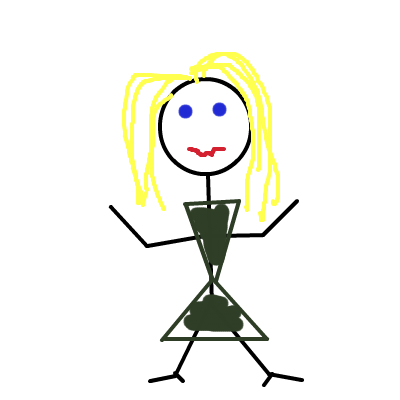
They're All Going To Laugh At You
What if they don't like it? What if everyone says it's terrible? What if you had written something else, instead? These questions will go through your mind when you write books, because this goes through every author's mind. But it doesn't matter how many books you publish. Questions like this will always go through your mind.
Based on my extensive research, it doesn't really get any easier. You're still going to doubt yourself and question yourself long after you've reached that solid fan base and the success you crave, assuming of course that you get it. Many successful authors still carry these feelings of fear and self-doubt.
It's part of being an artist. Every good artist continues to doubt and question, continues to strive to be better. Every artist fears that people will hate what they've produced, and many artists always feel like what they've created isn't quite perfect. That's good. You don't want to reach perfection, because what's left after that? It's good to question and to doubt, because that means you'll always be striving to do your very best.
It doesn't get easier to write books, but it's not supposed to. Writing books is hard, and the harder it is the better the book is. So embrace it, and be glad it's not easy. Great art should always be difficult to create.

They're All Going To Laugh At You
What if they don't like it? What if everyone says it's terrible? What if you had written something else, instead? These questions will go through your mind when you write books, because this goes through every author's mind. But it doesn't matter how many books you publish. Questions like this will always go through your mind.
Based on my extensive research, it doesn't really get any easier. You're still going to doubt yourself and question yourself long after you've reached that solid fan base and the success you crave, assuming of course that you get it. Many successful authors still carry these feelings of fear and self-doubt.
It's part of being an artist. Every good artist continues to doubt and question, continues to strive to be better. Every artist fears that people will hate what they've produced, and many artists always feel like what they've created isn't quite perfect. That's good. You don't want to reach perfection, because what's left after that? It's good to question and to doubt, because that means you'll always be striving to do your very best.
It doesn't get easier to write books, but it's not supposed to. Writing books is hard, and the harder it is the better the book is. So embrace it, and be glad it's not easy. Great art should always be difficult to create.
Published on October 15, 2014 05:30
October 14, 2014
Writing 101: Life Experience
Have you ever been really, really, really hungry? Have you ever stayed awake for 48 hours in a row? Did you break a bone? Did you fall in love...or fall out of it? Well, why don't you write it?

Life Experience
When you're a writer, you're going to hear the phrase life experience a lot. But you don't have to go to Italy or kill a guy in order to get life experience. Everything you've ever been through, no matter how seemingly mundane it is, can help you write a book. If you've felt hunger, if you've worked out until your muscles ached, if you've smelled the perfumed scent of a cigar -- all of it, any of it, can lend rich details to your book. And the other stuff that you haven't done? Well...you can use research for that.
Even if you feel like you haven't experienced much, you have experienced some things. You've gone to school. You've dressed yourself. You've taken a bath. If you can write about these things, and write about them well, you can make your book that much richer. Use the life experiences you'v got as the foundation for your scenes, and weave the plot on top of them.
What do I mean by that? For example, your character has been asked to Homecoming by two guys, and now she has to ponder this decision. Why not have her think about it while taking a shower, or a bubble bath, or whatever you like to do? You need two characters to talk to each other, so why not put them in a pizza parlor because you always hang out in a pizza parlor? You're uniquely qualified to write about these things because you've lived them, so you can add important details that make these scenes come to life.
Even the smallest experiences can be integrated into your book, and should. It's the small details that make your book feel more real and much more rich. Use all of your life experience to make your stories more complete and give scenes a strong sense of reality, and you'll notice the difference in your writing.

Life Experience
When you're a writer, you're going to hear the phrase life experience a lot. But you don't have to go to Italy or kill a guy in order to get life experience. Everything you've ever been through, no matter how seemingly mundane it is, can help you write a book. If you've felt hunger, if you've worked out until your muscles ached, if you've smelled the perfumed scent of a cigar -- all of it, any of it, can lend rich details to your book. And the other stuff that you haven't done? Well...you can use research for that.
Even if you feel like you haven't experienced much, you have experienced some things. You've gone to school. You've dressed yourself. You've taken a bath. If you can write about these things, and write about them well, you can make your book that much richer. Use the life experiences you'v got as the foundation for your scenes, and weave the plot on top of them.
What do I mean by that? For example, your character has been asked to Homecoming by two guys, and now she has to ponder this decision. Why not have her think about it while taking a shower, or a bubble bath, or whatever you like to do? You need two characters to talk to each other, so why not put them in a pizza parlor because you always hang out in a pizza parlor? You're uniquely qualified to write about these things because you've lived them, so you can add important details that make these scenes come to life.
Even the smallest experiences can be integrated into your book, and should. It's the small details that make your book feel more real and much more rich. Use all of your life experience to make your stories more complete and give scenes a strong sense of reality, and you'll notice the difference in your writing.
Published on October 14, 2014 05:30
October 13, 2014
Writing 101: Pre-Orders, Will They Work with Self-Publishing?
Pre-orders work for big-name titles like Harry Potter and The Hunger Games, but what about for you? If you do a long pre-order, won't all your fans end up owning your book before the actual publish date? What would you do then?

Selling, Before You Start Selling
Smashwords and Amazon, which are both very indie-friendly sites, both offer pre-order options that allow customers to pay for the book even before it's published. According to market research, books that are available through the pre-order option tend to sell more copies overall than the books that do not. And you need to know that, because the numbers also show that most indie authors don't use it. Why?
There are good reasons why indie authors probably aren't using the pre-order option. For starters, many indies may not know that this option is open to them. It is. There's also the fear that selling pre-ordered copies may interfere with later sales once the book is published. This is not true. In actuality, selling pre-orders is exactly what every indie needs to do. You need to sell as many of them as possible, because you can use that to your advantage.
The pre-order copies aren't available until your book is published. That means the transactions will complete that day, and this will give you a spike in sales the moment you publish your book. This can only benefit you as an indie author, that little spike. This will help you appear on bestseller lists and search results, which can generate more sales.
You can designate books for pre-order through Kindle, Smashwords, iBooks and a ton of other book-selling sights. Offer your book for sale in as many places as possible to get that starting spike, and get your book off to a good start.

Selling, Before You Start Selling
Smashwords and Amazon, which are both very indie-friendly sites, both offer pre-order options that allow customers to pay for the book even before it's published. According to market research, books that are available through the pre-order option tend to sell more copies overall than the books that do not. And you need to know that, because the numbers also show that most indie authors don't use it. Why?
There are good reasons why indie authors probably aren't using the pre-order option. For starters, many indies may not know that this option is open to them. It is. There's also the fear that selling pre-ordered copies may interfere with later sales once the book is published. This is not true. In actuality, selling pre-orders is exactly what every indie needs to do. You need to sell as many of them as possible, because you can use that to your advantage.
The pre-order copies aren't available until your book is published. That means the transactions will complete that day, and this will give you a spike in sales the moment you publish your book. This can only benefit you as an indie author, that little spike. This will help you appear on bestseller lists and search results, which can generate more sales.
You can designate books for pre-order through Kindle, Smashwords, iBooks and a ton of other book-selling sights. Offer your book for sale in as many places as possible to get that starting spike, and get your book off to a good start.
Published on October 13, 2014 05:30
October 9, 2014
Writing 101: You and I
When you and I talk about grammar, it confuses things for you and me. When do you use which, and how do you tell the difference?
Me and I
In order to know when to use I and when to choose me instead, you've got to know the difference between the two. They're both pronouns, but they're different types of pronouns. You see, I is a subject pronoun. Me is an object pronoun. So...what the heck does that mean?
When you are talking about yourself, you say I, as in I am writing today. You wouldn't say Me am writing today or me writing today. But you would say Don't you see me writing? instead of Don't you see I writing?
So what's the difference there? The difference is in the subject. In the first example, I is the one who is writing. I is the subject, because writing is your action. But in the second example, you is the subject because you is seeing something. What are they seeing? They're seeing me, because me is the object. That is, essentially, the difference between I and me.
Let's look at another example. You and I read books. Books frighten you and me. In the first sentence, you and I are the subject. We're reading, that's the action, books -- that's the object. In the second sentence, books are the subject because they are frightening, that's an action. What are they frightening? The objects: you and me.
Know the difference between the two, and you'll get it right every single time.
Me and I
In order to know when to use I and when to choose me instead, you've got to know the difference between the two. They're both pronouns, but they're different types of pronouns. You see, I is a subject pronoun. Me is an object pronoun. So...what the heck does that mean?
When you are talking about yourself, you say I, as in I am writing today. You wouldn't say Me am writing today or me writing today. But you would say Don't you see me writing? instead of Don't you see I writing?
So what's the difference there? The difference is in the subject. In the first example, I is the one who is writing. I is the subject, because writing is your action. But in the second example, you is the subject because you is seeing something. What are they seeing? They're seeing me, because me is the object. That is, essentially, the difference between I and me.
Let's look at another example. You and I read books. Books frighten you and me. In the first sentence, you and I are the subject. We're reading, that's the action, books -- that's the object. In the second sentence, books are the subject because they are frightening, that's an action. What are they frightening? The objects: you and me.
Know the difference between the two, and you'll get it right every single time.
Published on October 09, 2014 05:30
October 8, 2014
Writing101: Always Be Writing?
I'm not shy about the fact that I go on the prowl for writing tips. You're never done learning. But sometimes, the tips I find completely baffle me. The ones see most often is just perfect for a bumper sticker: always be writing. But as someone who actually always is writing, I've got to say it: this is a bad tip.
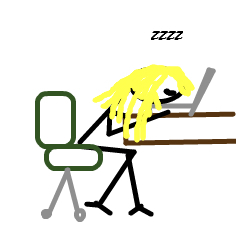
...Because You'd Die
This is yet another of those post where I'm going to tell you to do the exact opposite of what I do. I am a cautionary tale. Because I'm so always writing, I had to compose this blog post on two different devices. I literally can't move about my own home without writing something. Always be writing is nice and trite when you're writing something for Twitter, but as someone who has put this insane notion into practice I can assure you, it's terrible.
Don't get me wrong. I am a writer, and that's just great. It's swell. But the reality is that I'm so pressed for time I rarely sleep for 5 hours a night, I have to do research with one hand when I fold laundry in the mornings and I get all jazzed up about going out to get the mail because that's how often I get to see the daylight.
I don't know who first said always be writing, but authors latched onto it and they parrot it all over blogs all the livelong day. If I wasn't always writing, I would have more time to counter-act this by screaming stop writing. But all I've really got is this blog post.
Here's the point: your mind needs to rest. Your fingers need a break. Your eyes should just close for a little while, or at the very least stop being burned out by your laptop screen. It's incredibly difficult, nigh impossible, to be creative when you're exhausted and dozing off half the time and stressing out about where to put the comma the other half of the time. As of this moment, I've been writing for almost 13 hours. I did not stop for meals. I can eat with one hand and use the mouse with the other, after all.
And as you can tell, I'm rambling my way through this post because my thoughts are no longer capable of traveling in a straight line. The errors I'm making I'll go back and correct, but rest assured they are legion.
I am always writing, or at least I spend an inordinate amount of time doing it. I start working from the moment I wake up. The only time I ever just sit and eat something is my nightly yogurt. Every other time, I'm shoveling food in while I write. I see few people. I go to few places. My conversations almost always end with "can we talk about it later? I'm busy writing." Later doesn't come, because when it does there is still more writing to do.
I'm just going to say it. Always be writing is the worst advice ever, but I don't think you're supposed to take it literally. I think it means that you're supposed to try to write creatively every day. But frankly, that's not going to work for me, either. I haven't worked on my latest manuscript even once today, and I'm not going to. I have to get up again in less than 6 hours, and I haven't even had my yogurt yet. Always be writing is a cute thing to say, but it's not practical.
So here I am with my piece of advice: take a break when you get the chance. You can't always be writing, because it just won't work.

...Because You'd Die
This is yet another of those post where I'm going to tell you to do the exact opposite of what I do. I am a cautionary tale. Because I'm so always writing, I had to compose this blog post on two different devices. I literally can't move about my own home without writing something. Always be writing is nice and trite when you're writing something for Twitter, but as someone who has put this insane notion into practice I can assure you, it's terrible.
Don't get me wrong. I am a writer, and that's just great. It's swell. But the reality is that I'm so pressed for time I rarely sleep for 5 hours a night, I have to do research with one hand when I fold laundry in the mornings and I get all jazzed up about going out to get the mail because that's how often I get to see the daylight.
I don't know who first said always be writing, but authors latched onto it and they parrot it all over blogs all the livelong day. If I wasn't always writing, I would have more time to counter-act this by screaming stop writing. But all I've really got is this blog post.
Here's the point: your mind needs to rest. Your fingers need a break. Your eyes should just close for a little while, or at the very least stop being burned out by your laptop screen. It's incredibly difficult, nigh impossible, to be creative when you're exhausted and dozing off half the time and stressing out about where to put the comma the other half of the time. As of this moment, I've been writing for almost 13 hours. I did not stop for meals. I can eat with one hand and use the mouse with the other, after all.
And as you can tell, I'm rambling my way through this post because my thoughts are no longer capable of traveling in a straight line. The errors I'm making I'll go back and correct, but rest assured they are legion.
I am always writing, or at least I spend an inordinate amount of time doing it. I start working from the moment I wake up. The only time I ever just sit and eat something is my nightly yogurt. Every other time, I'm shoveling food in while I write. I see few people. I go to few places. My conversations almost always end with "can we talk about it later? I'm busy writing." Later doesn't come, because when it does there is still more writing to do.
I'm just going to say it. Always be writing is the worst advice ever, but I don't think you're supposed to take it literally. I think it means that you're supposed to try to write creatively every day. But frankly, that's not going to work for me, either. I haven't worked on my latest manuscript even once today, and I'm not going to. I have to get up again in less than 6 hours, and I haven't even had my yogurt yet. Always be writing is a cute thing to say, but it's not practical.
So here I am with my piece of advice: take a break when you get the chance. You can't always be writing, because it just won't work.
Published on October 08, 2014 05:30
October 7, 2014
Writing 101: Answering Questions About Your Book
Can you tell me about your book in 10 words or less? If you can't, figure out how to do it right now. Because people are going to ask you questions about your books. When they do, your answers need to be short and to the point. Otherwise, the person asking will lose interest...and they definitely won't read the book, then.
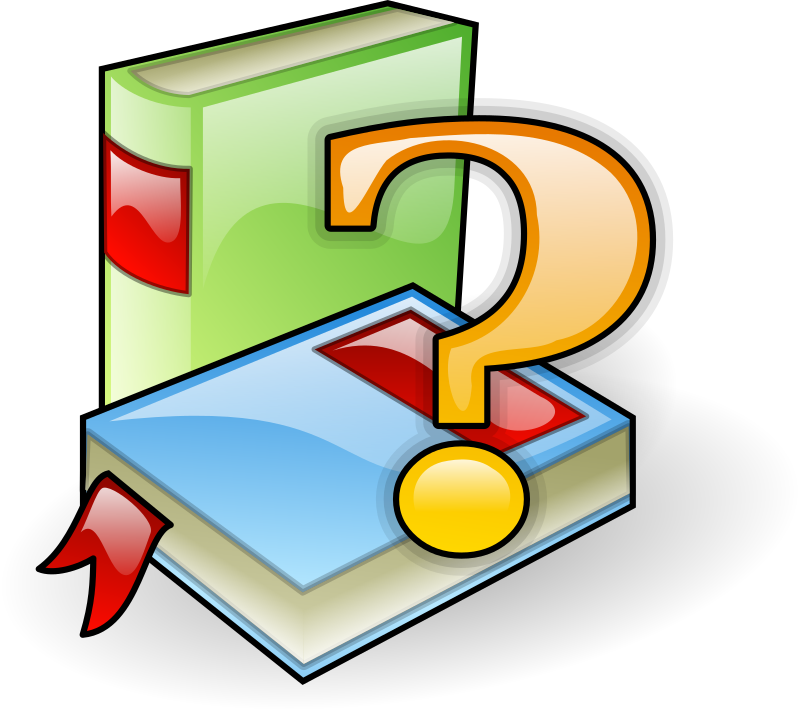
10 Words or Less
A story of deception, murder and self-discovery.
A world where life is already mapped out for you.
What happens when a world of lies comes crashing down?
Each one of those lines describes one of my books, and they do it in 10 words or less. If you feel any interest or curiosity at all about those lines, I've done my job. If someone asked me what is your book about, I could answer with one of these lines and call it day. And that's exactly what I would do. Save the much longer answer for the blurb. The shorter answers you get to use everywhere else.
If you're participating in forums and being opportunistic, you'll get interviewed about your books. If you're telling people you're an author, you'll get asked about your books. You need to know how to answer those questions, and you need to do in a way that's quick and interesting. The less information you give them, the more they will want. Tell them just enough, and then no more. Giving a long answer will only kill interest, and it's asking people to absorb too much information. The main thing they need to know is the title. If you leave them with a vague sense of curiosity and the name of the title, you've done an amazing job.
So give them just what they need to know, and get good at answering questions about your book.

10 Words or Less
A story of deception, murder and self-discovery.
A world where life is already mapped out for you.
What happens when a world of lies comes crashing down?
Each one of those lines describes one of my books, and they do it in 10 words or less. If you feel any interest or curiosity at all about those lines, I've done my job. If someone asked me what is your book about, I could answer with one of these lines and call it day. And that's exactly what I would do. Save the much longer answer for the blurb. The shorter answers you get to use everywhere else.
If you're participating in forums and being opportunistic, you'll get interviewed about your books. If you're telling people you're an author, you'll get asked about your books. You need to know how to answer those questions, and you need to do in a way that's quick and interesting. The less information you give them, the more they will want. Tell them just enough, and then no more. Giving a long answer will only kill interest, and it's asking people to absorb too much information. The main thing they need to know is the title. If you leave them with a vague sense of curiosity and the name of the title, you've done an amazing job.
So give them just what they need to know, and get good at answering questions about your book.
Published on October 07, 2014 05:30



